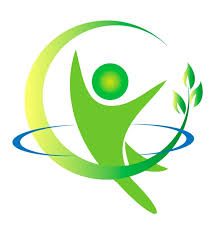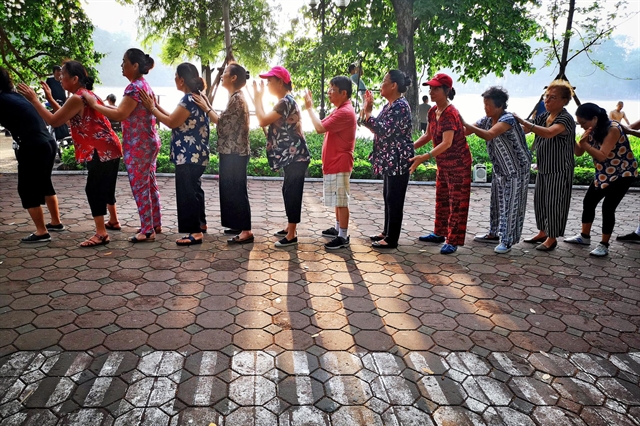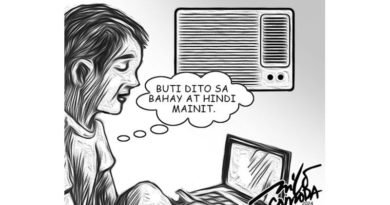SOCIETY | Elderly Vietnamese struggle with multiple diseases and short healthy lifespan
Elderly people do exercises near Hoàn Kiếm Lake, Hà Nội. — VNS Photo Việt Thanh
.
With the average number of healthy years for Vietnamese citizens hovering at just 64, health concerns loom large for this ageing population.
.

HÀ NỘI — For many elderly people in Việt Nam, living with multiple diseases, or comorbidities, is a harsh reality.
With the average number of healthy years for Vietnamese citizens hovering at just 64, health concerns loom large for this ageing population.
Trần Thị Nh., a 75-year-old resident of the northern province of Hưng Yên, is one such individual who struggles with multiple health conditions. She suffers from degenerative joint disease, poly-neuritis, chronic lung disease and colon pathology, making everyday activities a challenge.

@[email protected]
As the weather changes, Nh. experiences coughing fits and difficulty breathing. She must be careful with her diet and hydration, as consuming the wrong foods or drinks can trigger a relapse of her colon disease.
The struggles of Nh. and other elderly Vietnamese citizens highlight the need for greater support and resources to improve the quality of life for this vulnerable demographic.
Huỳnh Thị M., 69, of the north-eastern province of Quảng Ninh, has suffered from dementia for four years.
She has now almost lost her memory because the symptoms of the disease were only detected at a late stage, she said.
She also suffers from complications of diabetes, which causes kidney failure.
Trần Thị D., 89, living in Hà Nội, has spent nine months at the National Geriatric Hospital because of a stroke.
She now needs to learn to move and walk again. However, she will have to stay at the hospital for several months for further treatment because her blood pressure fluctuates constantly.
Under a study by the hospital, the hospital’s patients over 80 years old suffer from up to six diseases simultaneously, such as diabetes, hypertension, osteoarthritis, parkinsonism, dementia and stroke, the Nhân dân (People) online newspaper reported.
In the meantime, research by the Institute of Population, Health and Development shows that 62.3 per cent of elderly people have high blood pressure, and only 86.3 per cent have access to healthcare services.
The research also reveals that 67 per cent of the elderly have poor health. On average, an elderly person has three diseases that need monitoring and medical care.

@[email protected]
It is forecasted that in 2049 the number of elderly people needing medical support will increase by 2.5 times compared to the current level of 4 million people.
The number of elderly people in Việt Nam has continuously increased rapidly in recent years. There are about 11.4 million elderly people, accounting for 11.86 per cent of the population. Việt Nam officially entered the ageing population phase in 2011, six years faster than previous forecasts.
Statistics from the General Office for Population and Family Planning show that in 2021, the ageing index reached 53.1 per cent. It means that for every 100 children under 15 years old, there are about 53 elderly people aged 60 and over.
The trend of population ageing is happening rapidly. The proportion of the young population aged 0-14 years old continuously decreased from 24.5 per cent in 2009 to 24.3 per cent in 2019 and 24.1 per cent in 2021. The elderly population aged 65 and over continuously increased from 6.4 per cent in 2009 to 7.7 per cent in 2019 and 8.3 per cent in 2021.

@[email protected]
Improving the elderly life quality
Nguyễn Trung Anh, director of the National Geriatric Hospital, said that in developed countries, people often prepared a road map for their old age many decades ago.
In the meantime, most of Vietnamese people do not have financial planning since middle age to prepare for their old age, he said.
Thus, when old age comes, they have to suffer from many diseases with expensive medical costs, thereby creating burdens on their family and the social security system, he said.
Phạm Thắng, president of the Việt Nam Association of the Elderly, said that health care for the elderly is an urgent need while medical services for the elderly in Việt Nam are still limited.
“We currently lack geriatricians, geriatric nurses and human resources to take care of the elderly,” he said.
Besides, he added that the system of nursing homes and social protection centres is still limited in quantity and quality.

@[email protected]
He said it is an issue we need to pay more attention to.
Nguyễn Thanh Bình, director of the hospital’s Centre for Memory and Dementia Research, said the country has a geriatric system from central to lower-level hospitals.
“But we have not yet trained specialised medical staff to give health care for the elderly,” he said.
Currently, health insurance fund only covers costs of examination and medicine for dementia patients treated at central-level hospitals, he said.
He said the fund does not cover the costs at lower-level hospitals nor the costs of rehabilitation techniques, palliative care and interventional techniques.
It thus also creates economic pressure on the elderly, he said.
Phan Việt Sinh, deputy director of the hospital, said it is necessary to support the elderly with self-help knowledge and skills while the country has yet to have a very good elderly health care system.
It is estimated that 50 per cent of the success of care and treatment for the elderly comes from nutrition and rehabilitation, he said.
Therefore, it is also imperative to disseminate knowledge to both the elderly people and their relatives to help the elderly to prepare for their old age, he said.
Moreover, the health sector has to strengthen the training of doctors and nurses soon to serve the need for medical support of the elderly people, he said. — VNS










